-
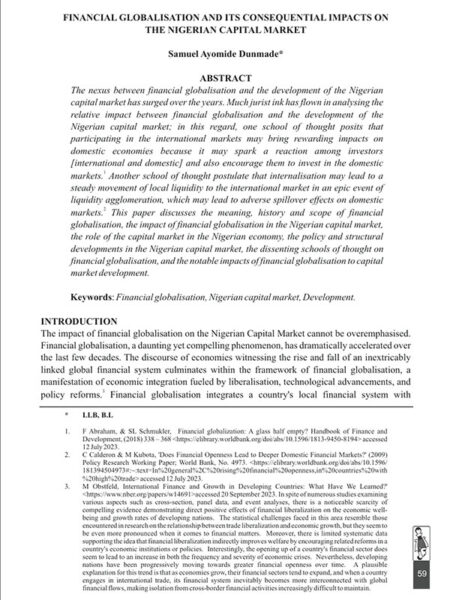
Financial Globalisation and its Consequential Impacts on the Nigerian Capital Market
0₦2,500.00Samuel Dunmade, in his article, Financial Globalisation and its Consequential Impacts on the Nigerian Capital Market, examines the concept of financial globalisation and its impact on the Nigerian capital market. The nexus between financial globalisation and the development of the Nigerian capital market has surged over the years. Much jurist ink has flown in analyzing the relative impact between financial globalisation and the development of the Nigerian capital market; in this regard, one school of thought posits that participating in the international markets may bring rewarding impacts on domestic economies, because it may spark a reaction among investors [international and domestic] and also encourage them to invest in the domestic markets. Another school of thought postulates that the internalization may lead to a steady movement of local liquidity to the international market in an epic event of liquidity agglomeration, which may lead to negative spill-over effects on domestic markets. Dunmade discusses the meaning, history and scope of financial globalization, the impact of financial globalisation in the Nigerian capital market, the role of capital market in the Nigerian economy, the policy and structural developments in the Nigerian capital market, the dissenting schools of thought on financial globalization, and the notable impacts of financial globalisation to capital market development.
-
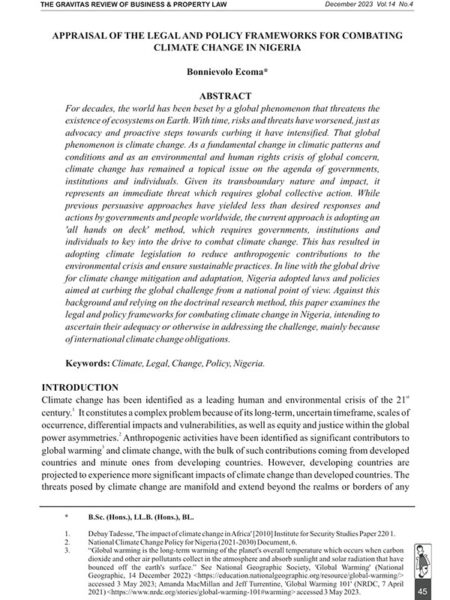
Appraisal of the Legal and Policy Frameworks for Combating Climate Change in Nigeria
0₦2,500.00Bonnievolo Ecoma, in this article, Appraisal of the Legal and Policy Frameworks for Combating Climate Change in Nigeria, appraises the legal and policy frameworks for combating climate change in Nigeria. For decades, the world has been beset by a global phenomenon that threatens the existence of ecosystems on Earth. With time, risks and threats have worsened, just as advocacy and proactive steps towards curbing it have intensified. That global phenomenon is climate change. As a fundamental change in climatic patterns and conditions, and as an environmental and human rights crisis of global concern, climate change has remained a topical issue on the agenda of governments, institutions, and individuals. Given its trans-boundary nature and impact, it represents an immediate threat which requires global collective action. While previous persuasive approaches have yielded less than desired responses and actions by governments and people around the world, the current approach is the adoption of an ‘all hands on deck’ method which requires governments, institutions and individuals to key into the drive to combat climate change. This has resulted in the adoption of climate legislation aimed at reducing anthropogenic contributions to the environmental crisis, and ensuring sustainable practices. In line with the global drive for climate change mitigation and adaptation, Nigeria adopted laws and policies aimed at curbing the global challenge from a national point of view. Against this background and relying on the doctrinal research method, Ecoma examines the legal and policy frameworks for combating climate change in Nigeria, with a view to ascertaining their adequacy or otherwise in addressing the challenge, especially in view of international climate change obligations.
-
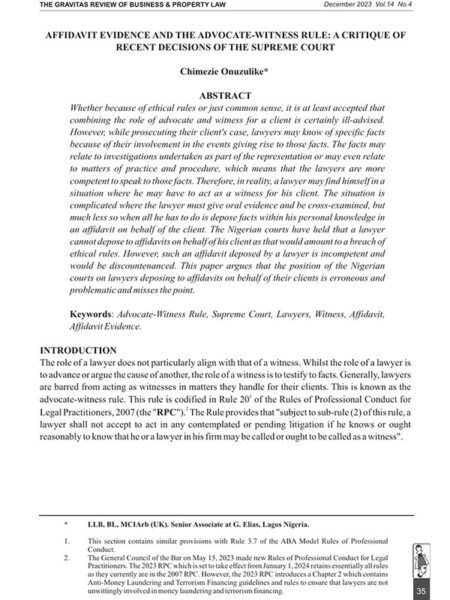
Affidavit Evidence and The Advocate-Witness Rule: A Critique of the Recent Decisions of the Supreme Court
0₦2,500.00Chimezie Onuzulike, in his article, Affidavit Evidence and The Advocate-Witness Rule: A Critique of the Recent Decisions of the Supreme Court, examines the ethical issues arising when counsel combines the role of advocate and witness for a client. Onuzulike posits that in the course of prosecuting their client’s case, lawyers may know of certain facts because of their involvement in the events giving rise to those facts. The facts may relate to investigations undertaken as part of the representation or may even relate to matters of practice and procedure, which means that the lawyers are more competent to speak to those facts. Therefore, in reality, a lawyer may find himself in a situation where he may have to act as a witness for his client. The situation is complicated where the lawyer is required to give oral evidence and be cross-examined, but much less so when all he has to do is depose to facts within his personal knowledge in an affidavit on behalf of the client. The Nigerian courts have not only held that a lawyer cannot depose to affidavits on behalf of his client as that would amount to a breach of ethical rules, but also that such an affidavit deposed to by a lawyer is incompetent and would be discountenanced. Onuzulike argues that the position of the Nigerian courts on lawyers deposing to affidavits on behalf of their clients is erroneous, problematic and misses the point.
-
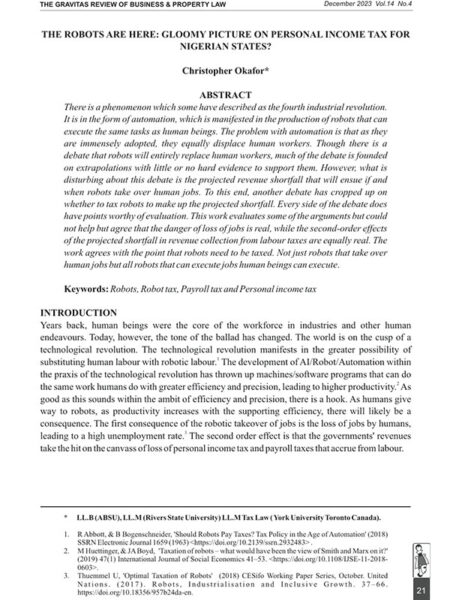
The Robots Are Here: Gloomy Picture on Personal Income Tax for Nigerian States?
0₦2,500.00Christopher Okafor Esq, in this article, The Robots Are Here: Gloomy Picture on Personal Income Tax for Nigerian States, examines the emergence of robots in the workplace with its potentiality for job losses and a reduction in taxable revenue. The emerging phenomenon which some have described as the fourth industrial revolution is in the form of automation which is manifested in the production of robots that can execute the same tasks as human beings. The problem with the automation is that as they are immensely adopted, they equally displace human workers. Though there is a debate that robots will fully replace human workers, much of the debate is founded on extrapolations with little or no hard evidence to support. However, what is disturbing about this debate is the projected revenue shortfall that will ensue if and when robots take over human jobs. To this end, another debate has cropped up on whether to tax robots to make up the projected shortfall. Every side of the debate does have points worthy of evaluation. Okafor evaluates some of the arguments but could not help but agree that the danger of loss of jobs is real, while the second order effects of projected shortfall in revenue collection from labour taxes is equally real. Okafor agrees with the point that robots need to be taxed. Not just robots that take over human jobs but all robots that can execute jobs human beings can execute.
-
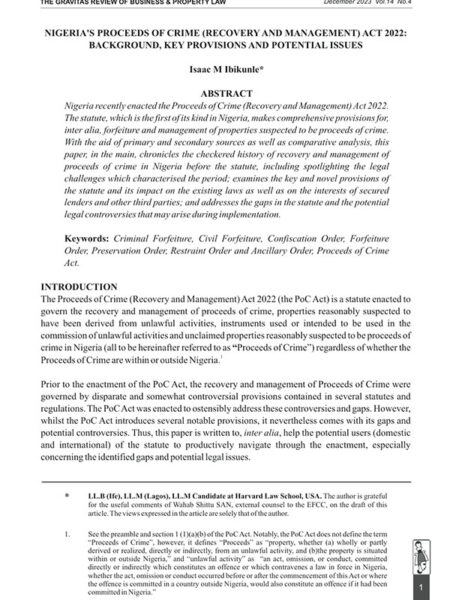
Nigeria’s Proceeds of Crime (Recovery and Management) Act 2022: Background, Key Provisions and Potential Issues
0₦2,500.00Isaac Ibikunle, in his article, Nigeria’s Proceeds of Crime (Recovery and Management) Act 2022: A Review of Key Provisions and Issues Arising, examines Nigeria’s recently enacted Proceeds of Crime (Recovery and Management) Act 2022. The statute, which is the first of its kind in Nigeria, makes comprehensive provisions for forfeiture and management of properties suspected to be proceeds of crime. With the aid of primary and secondary sources as well as comparative analysis, Ibikunle chronicles the checkered history of recovery and management of proceeds of crime in Nigeria prior to the statute, including spotlighting the legal challenges which characterised the period; examines the key and novel provisions of the statute and its impact on the existing laws as well as on the interests of secured lenders and other third parties; and addresses the gaps in the statute and the potential legal controversies that may arise during implementation.
-
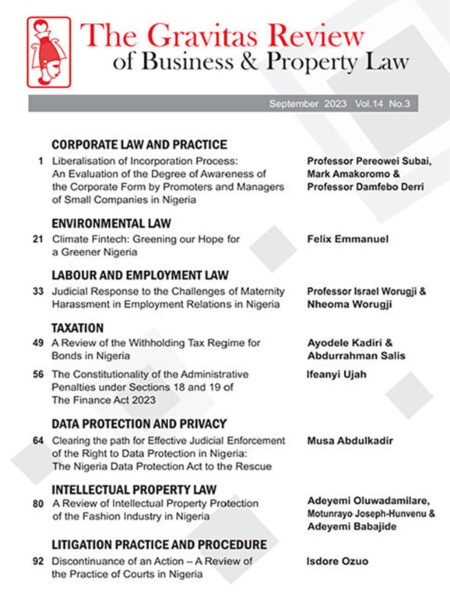
The Gravitas Review of Business & Property Law Vol.14 No.3 – Print
0₦5,000.00In this issue of The Gravitas Review of Business & Property Law Vol.14 No.3, there are well researched articles on:
- Corporate & Securities Law
- Environmental Law
- Labour & Employment Law
- Taxation
- Data Protection & Privacy
- Intellectual Property Law
- Litigation Practice & Procedure
-

The Gravitas Review of Business & Property Law Vol.14 No.3 – E-Book
0₦5,000.00In this issue of The Gravitas Review of Business & Property Law Vol.14 No.3, there are well researched articles on:
- Corporate & Securities Law
- Environmental Law
- Labour & Employment Law
- Taxation
- Data Protection & Privacy
- Intellectual Property Law
- Litigation Practice & Procedure
-

The Gravitas Review of Business & Property Law Vol.14 No.3
0₦5,000.00In this issue of The Gravitas Review of Business & Property Law Vol.14 No.3, there are well researched articles on:
- Corporate & Securities Law
- Environmental Law
- Labour & Employment Law
- Taxation
- Data Protection & Privacy
- Intellectual Property Law
- Litigation Practice & Procedure
-
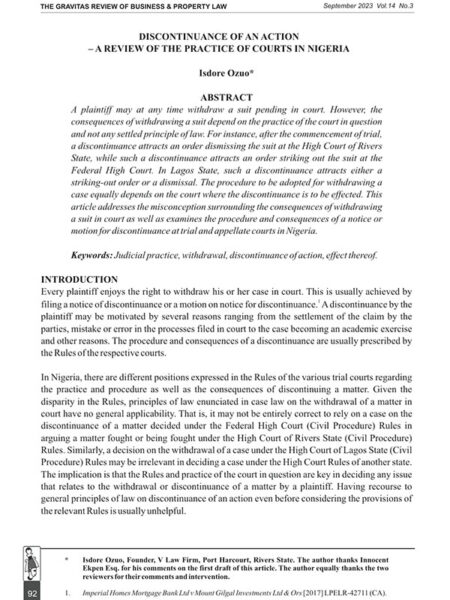
Discontinuance of an Action – A Review of the Practice of Courts in Nigeria
0₦2,500.00Isdore Ozuo, in his article, Discontinuance of an Action – A Review of the Practice of Courts in Nigeria, analyses the legal provisions on the right of a plaintiff to discontinue an action in the different strata of court. A plaintiff may at any time withdraw a suit pending in court. However, the consequences of withdrawing a suit depend on the practice of the court in question and not any settled principle of law. For instance, after the commencement of trial, a discontinuance attracts an order dismissing the suit at the High Court of Rivers State, while such a discontinuance attracts an order striking out the suit at the Federal High Court. In Lagos State, such a discontinuance attracts either a striking out order or a dismissal. The procedure to be adopted for withdrawing a case equally depends on the court where the discontinuance is to be effected. The article addresses the misconception surrounding the consequences of withdrawing a suit in court as well as examines the procedure and consequences of a notice or motion for discontinuance at trial and appellate courts in Nigeria.
-
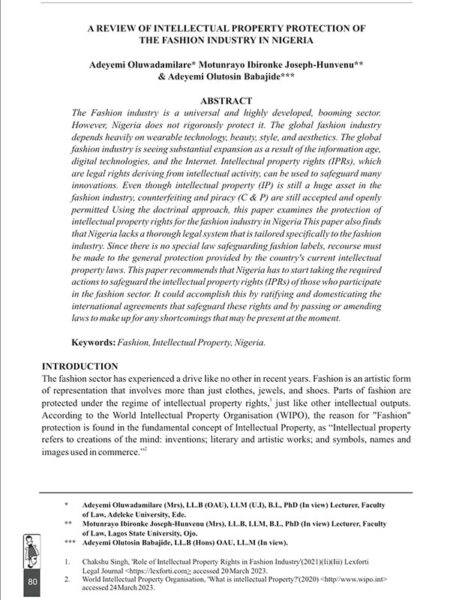
A Review of Intellectual Property Protection of the Fashion Industry in Nigeria
0₦2,500.00Adeyemi Oluwadamilare, Motunrayo Joseph-Hunvenu and Adeyemi Babajide, in their article, A Review of Intellectual Property Protection of the Fashion Industry in Nigeria, explore the legal regime for the protection of intellectual rights in the fashion industry in Nigeria. The fashion industry is a universal and highly developed, booming sector. However, Nigeria does not rigorously protect it. The global fashion industry depends heavily on wearable technology, beauty, style, and aesthetics. The industry is seeing substantial expansion as a result of the information age, digital technologies, and Internet. Intellectual property rights (IPRs), which are legal rights deriving from intellectual activity, can be used to safeguard many innovations. Despite the fact that intellectual property (IP) is still a huge asset in the fashion industry, counterfeiting and piracy are accepted and openly permitted. Using the doctrinal approach, this paper examines the protection of IPRs for the fashion industry in Nigeria The paper finds that Nigeria lacks a thorough legal system that is tailored specifically to the fashion industry. Since there is no special law safeguarding fashion labels, recourse must be made to the general protection provided by the country’s current intellectual property laws. The paper recommends that Nigeria has to start taking the required actions to safeguard the IPRs of those who participate in the fashion sector. It could accomplish this by ratifying and domesticating the international agreements that safeguard these rights and by passing or amending laws to make up for any shortcomings that may be present at the moment.
-
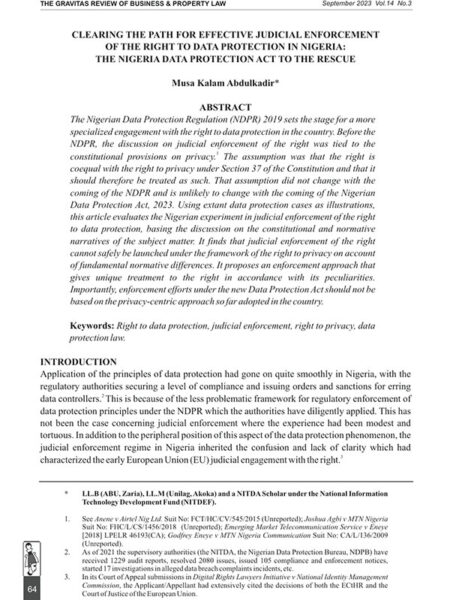
Clearing the Path for Effective Judicial Enforcement of the Right to Data Protection in Nigeria: The Nigeria Data Protection Act to the Rescue
0₦2,500.00Musa Kalam Abdulkadir, in his article, Clearing the Path for Effective Judicial Enforcement of the Right to Data Protection in Nigeria: The Nigeria Data Protection Act to the Rescue, examines the innovations introduced by the Nigerian Data Protection Regulation (NDPR) 2019, which sets the stage for the passing of the Nigerian Data Protection Act 2023. Before the NDPR, discussion on judicial enforcement of the right was tied to the constitutional provision on privacy. The assumption was that the right is co-equal with the right to privacy under Section 37 of the Constitution and that it should therefore be treated as such. That assumption did not change with the coming of the NDPR and is unlikely to change with the coming of the Nigerian Data Protection Act, 2023. Using extant data protection cases as illustration, this article evaluates the Nigerian experiment in judicial enforcement of the right to data protection, basing the discussion in the constitutional and normative narratives of the subject matter. It finds that judicial enforcement of the right cannot safely be launched under the framework of the right to privacy on account of fundamental normative differences. It proposes an enforcement approach that gives unique treatment to the right in accordance with its peculiarities. Importantly, enforcement efforts under the new Data Protection Act should not be based on the privacy-centric approach so far adopted in the country.
-
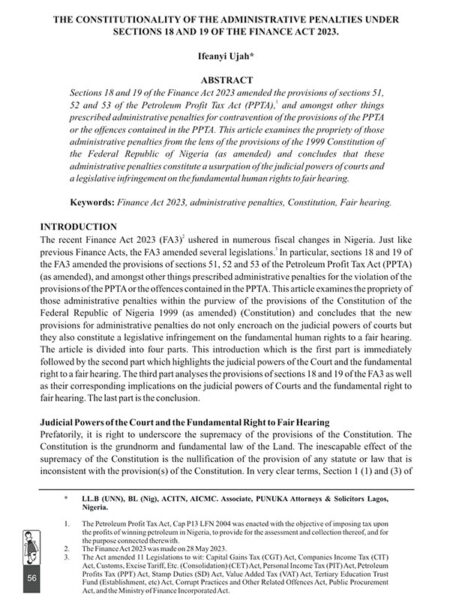
The Constitutionality of the Administrative Penalties Under Sections 18 and 19 of the Finance Act 2023
0₦2,500.00Ifeanyi Ujah, in his article The Constitutionality of the Administrative Penalties Under Sections 18 and 19 of the Finance Act 2023, examines the constitutionality of Sections 18 and 19 of the Finance Act 2023 which amended Sections 51, 52 and 53 of the Petroleum Profit Tax Act (PPTA). The article examines the propriety of those administrative penalties introduced by the amendment against the background of the 1999 Constitution of the Federal Republic of Nigeria. It concludes that these administrative penalties constitute a usurpation of the judicial powers of courts and a legislative infringement on the fundamental human rights to fair hearing.
The Gravitas Review of Business & Property Law



